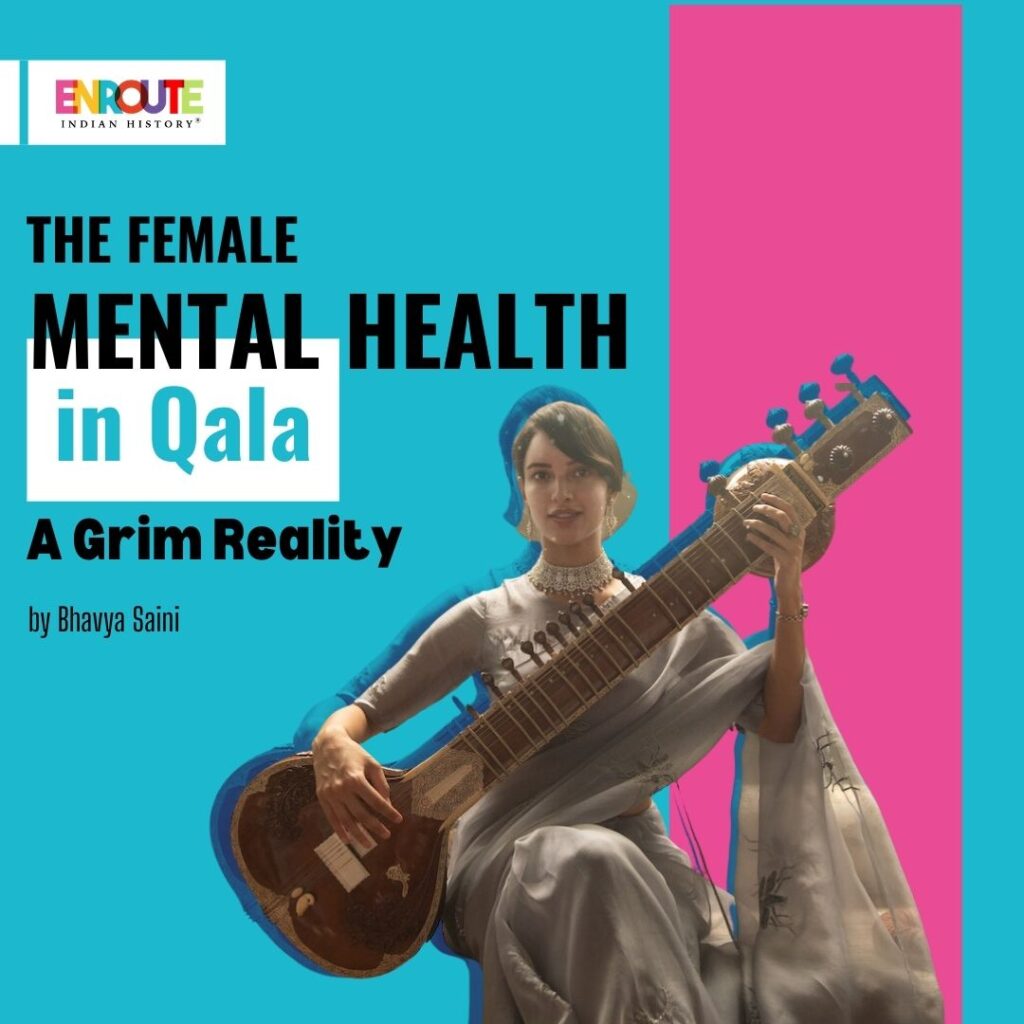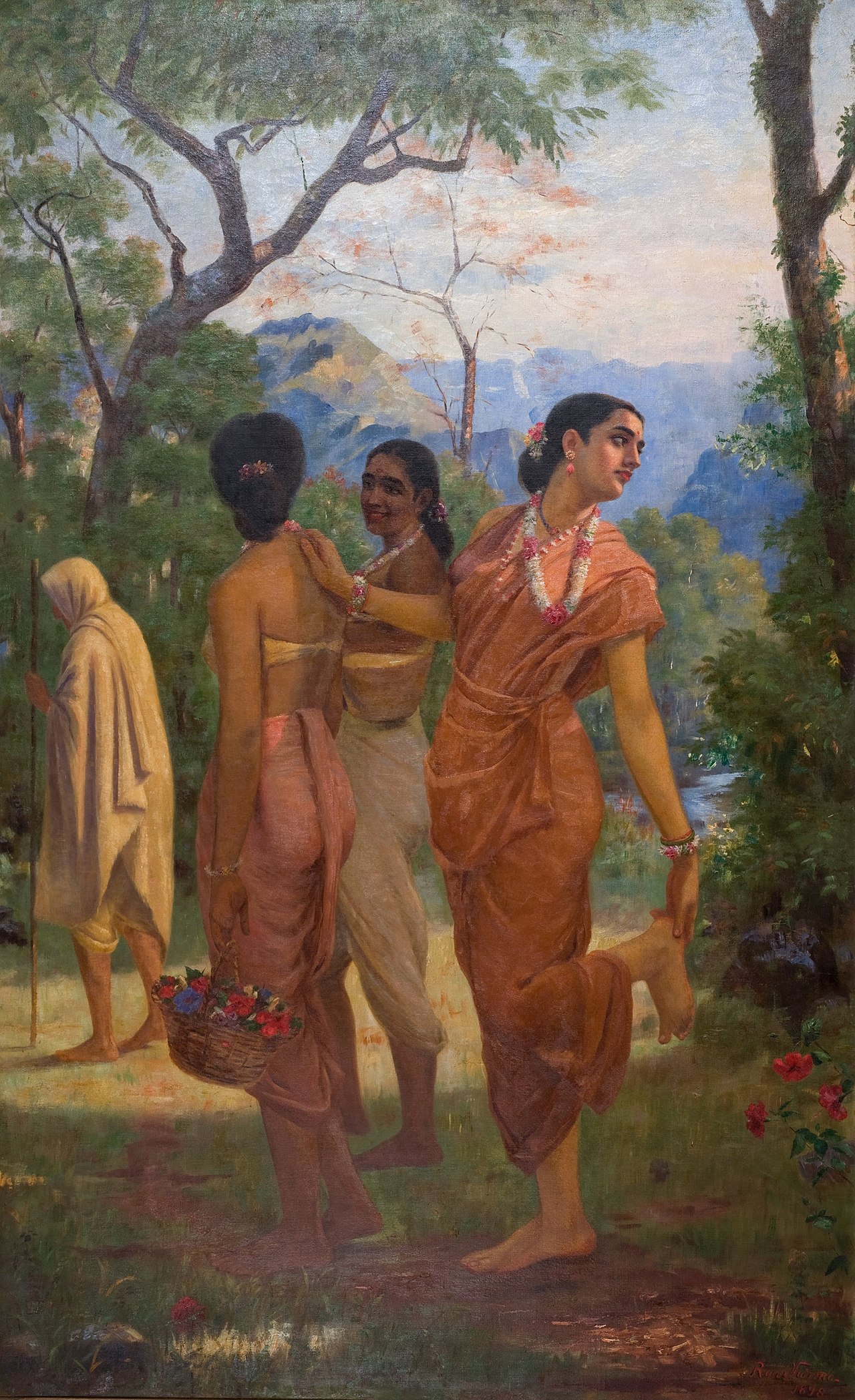
Article Written By EIH Researcher And Writer
Bhavya Saini
When we talk about Bollywood films, we tend to imagine a dramatic plot with item songs, comic scenes, family drama and cringe romantic dialogues. However, over the years the Hindi film industry has started appreciating the works of experimental filmmakers in their attempt to put forward a more honest and reflective version of art and expression which does not disregard the reality of the society hiding it behind a romanticised façade. One such filmmaker is Anvitaa Dutt whose recent film Qala (2022) is nothing short of an actual ‘qala’. Much like her directorial debut Bulbbul (2020) , Qala presents the gendered status of women in the society through a unique lens. Apart from the themes of sexism and abuse, Qala seeks to establish the persistent issue of female mental health.
Along with a talented cast of Triptii Dimri, Babil Khan and Swastika Mukherjee among others, the melodious musical score by Amit Trivedi and the marvellous cinematography of Siddharth Diwan which brought the frames to life, the film discusses more significant and consequential issues of the society. Triptii Dimri, with her charm and talent does justice to the titular role of Qala, an aspiring female playback singer who must carry the legacy of her father in order to win her mother’s approval. Urmila (Swastika Mukherjee), who was a Thumri singer herself in her prime age, shows an aversion towards her daughter as a “gatekeeper” of the patriarchal lineage that must be carried on by a son. When she realises that her ambitions cannot be fulfilled by her ‘talentless’ daughter, she adopts an orphan, Jagan, (Babil Khan) smitten by his soulful voice. While the plot of the film mainly revolves around how Qala is the alter-ego of Jagan, how he was everything she could never be, it subtly intertwines the theme of mental health along with itself. The ignorance of her mother, her aversion towards her daughter, the refusal of parental approval, the denied love and affection of a mother, all push Qala to the brink of depression and anxiety and ultimately her death.

Varun Grover as Majrooh. Credits: ScoopWhoop
“Sab Kuch Apne Andar Aise Daba Ke Rakhogi, Chhupa Ke Rakhogi,
Duba Ke Rakhogi, Ek Din Sahlaab Aayega.”
- Majrooh (Varun Grover) in Qala (2022)
Lyricist Majrooh, a confidante and good friend to Qala, predicts her ultimate fall many times in the film. He advises her to open up her heart and talk about her issues, yet the social taboos about mental health only encourage her to bottle up her emotions until they finally become the end of her, so much so that her physician diagnosed her symptoms as premenstrual syndrome or PMS. This was quite common during an era when people were not ready to accept mental illness as a regular ailment. While the timeline of the film is not certain, it can be deduced through various clues that it is set around 1940-50s, an era when male singers were highly regarded as ‘Pandits’ while female singers were often reduced to ‘Bai’ and were not considered sophisticated or respectable. A scene from the film represents this sexist ideology when Urmila remarks that wouldn’t have a female singer in her home as Qala retorts that she shouldn’t be there too. Mayoor Lookhar, in his review about Qala mentions, “The toxic environment, both personal and later professional, takes a heavy toll on Qala. Not all of it is external, as Qala’s ambitions are partly to blame for her internal turmoil.” The film also throws light upon the grim reality of a male-dominated workplace where a woman can only stand if she favours the man. In her attempt to seek acceptance from her estranged mother, Qala gets so obsessed with her ambitions that she unleashes a rather darker side of hers and the sexual abuse in her later life only worsens it.

Charlotte Perkins Gilman. Credits: The Guardian
The film subtly touches upon the topic of hysteria, an outdated diagnosis which was quite common in the nineteenth century. Women who experienced excessive emotional outbursts were often diagnosed with this and treated with ‘rest-cure’ in which they were advised to stay indoors and not indulge in any work. However, after years of research and study, this treatment was nullified with the advancement in the field of psychology. Charlotte Perkins Gilman’s short story The Yellow Wallpaper is an insightful work which explores the mind of a woman who is diagnosed with hysteria and attempts to break away from the shackles of patriarchal discourse, much like Qala.
Avneesh Kumar, in his article, remarks how “the film underlines the difficulties women faced, and still face, in a society that favours men.” Qala highlights how years of subjection and discrimination against women have gradually resulted in the suppression of their feelings and emotions which eventually make them mentally vulnerable. The film dwells upon how female mental health has been long ignored and disregarded – “In India, depression and anxiety in women is twice as much as in men and affects twenty-five per cent of women.” Even if Qala is able to make a name for herself despite all odds, she is still unable to win her mother’s approval. She has it all – fame, luxury, respect – but at what cost? This is a story of not just Qala, but many such women who are deprived of opportunities, respect and acceptance only because they are not a man – “A strong inverse relationship exists between social position and physical and mental health outcomes. Hence, the effect of biological vulnerability is increased by the social disadvantages that women have.” In the contemporary era, we not only find women struggling with the first-hand issues like gender-roles, abuse, sexism, but we find them struggling each day to be considered as equals and somewhere in this journey, they tend to lose themselves. Yet we observe how the confidante women like Sudha (Girija Oak) and Naseeban Appa (Tasveer Kamil) become temporary refuge to Qala’s internal turmoil trying to make her feel less alone and more accepted in her alienated life showing how solidarity and sisterhood may make it easier to survive in a world which is dominated by men.
“Daur Badlega, Daur Ki Yeh Purani Aadat Hai.”
- Qala (2022)
References
Kumar, Avneesh. “Patriarchy and the music industry: review of the film Qala.”
Lookhar, Mayoor. “Qala Review: Music, Melancholia Galore In Anvitaa Dutt’s Art ‘house’ Drama.” https://beyondbollywood.home.blog/2022/12/04/qala-review-music-melancholia-galore-in-anvitaa-dutts-art-house-drama/
https://www.ncbi.nlm.nih.gov/pmc/articles/PMC4539863/
https://timesofindia.indiatimes.com/blogs/methink/world-mental-health-day-mental-health-and-women/



















